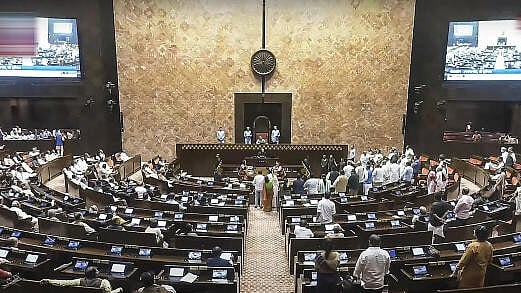
File photo of Monsoon session of Parliament.
Credit: Sansad TV via PTI Photo
New Delhi: Two weeks have gone by but the Joint Committee of Parliament to examine the contentious Bills for removal of top political executives detained in jail for at least 30 days in a row is yet to be set up, amid four parties announcing boycott of the panel and some Opposition parties yet to give names.
This is in contrast to the speedy constitution of Joint Committees of Parliament on Waqf (Amendment) Bill 2024 and The Constitution (129th Amendment) Bill 2024 and The Union Territories Laws (Amendment) Bill, 2024 seeking simultaneous elections to Lok Sabha and state Assemblies.
Seeking the removal of Prime Minister, Chief Ministers and ministers if they remain in custody for 30 days in a row, the Constitution (130th Amendment) Bill, The Jammu and Kashmir Reorganisation (Amendment) Bill and The Union Territories Administration (Amendment) Bill were introduced in Lok Sabha on August 20 and referred to the Joint Committee but without names of members. A motion to nominate Rajya Sabha MPs was moved a day later.
The announcement on the members of the committee have not been made so far in the Parliamentary bulletins, amid Trinamool Congress, Samajwadi Party, AAP and Shiv Sena (UBT) announced that they will not join the panel, as the Bills were being used as a “political weapon”.
Sources said Congress has not sent any communication to the Lok Sabha Secretariat on joining the JPC, amid divergence of views within the party and in the I.N.D.I.A bloc. RJD, which has not publicly announced its decision, is also disinclined to join the panel.
Congress sources maintained that the issue of whether to join the panel or not is under “active consideration”, as the leadership is weighing the arguments for and against participating in the deliberations. One of the main concerns for the party is that joining the panel would mean snubbing other I.N.D.I.A partners.
A senior Opposition leader said discussions are continuing with parties and they would take a “united” decision. At the same time, the leader also cited the Opposition’s consistent demand for sending Bills to Parliamentary panels and wondered how they could justify the boycott.
A section in the Opposition is citing how their dissent notes on Waqf Bill played a role during court hearings, others claim that the joint committees have lost their purpose under the BJP. Sources also cited the Opposition boycotting the Joint Committee probing Bofors scandal in 1987 claiming that the panel was packed with Congress MPs.
While the report on the Waqf Bill tabled in January and the legislation passed in April this year during the Budget Session, the deliberations of the ‘One Nation, One Election’ Bills are underway.
The motion for the joint committee on Waqf Bill was moved in Lok Sabha and Rajya Sabha on August 9 last year, a day after the proposed legislation was introduced in the Lower House. While the motion did not have the names of members of the joint panel, the Lok Sabha and Rajya Sabha bulletins on August 13 publicised the details of MPs in the panel.
The motion for setting up a joint committee on ‘ONOE’ Bills were placed in both Houses on December 20 last year. The motion itself had names of 31 MPs while eight more names were added later.
